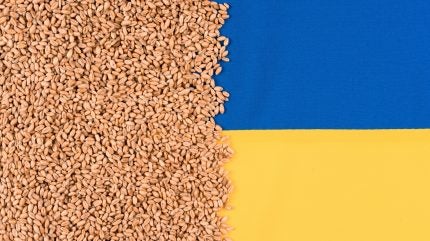
The published details of the new trade deal between EU and Ukraine have drawn criticism from a group of industry associations.
A group of agricultural associations including farm lobby group Copa-Cogeca, acknowledged the revised agreement’s aim to bring “long-term certainty and stability to our trade relations, which is vital for producers on both sides”.

Discover B2B Marketing That Performs
Combine business intelligence and editorial excellence to reach engaged professionals across 36 leading media platforms.
However, they added: “The scale of the concession is disproportionate for some of these sensitive agricultural sectors, and leave producers exposed and unsupported, at a time when these sectors are already under pressure from previous and upcoming cumulative trade liberalisation.”
The EU and Ukraine reached an agreement in principle on the new trade deal last week. Further details were published yesterday (8 July).
According to the agricultural trade bodies, the revised agreement includes increases in tariff-rate quotas for products such as sugar (+498%), honey (+583%), poultry (+30%), eggs (+300%), maize (+54%) and ethyl alcohol (+25%).
Following disruptions to Black Sea shipping routes in June 2022 due to ongoing conflicts, the EU temporarily lifted duties and quotas on certain Ukrainian agricultural products.

US Tariffs are shifting - will you react or anticipate?
Don’t let policy changes catch you off guard. Stay proactive with real-time data and expert analysis.
By GlobalDataThese measures saw some resistance from EU member states neighbouring Ukraine, who were concerned about the potential negative effects of lower-priced imports on their farming sectors.
By 2024, the EU had implemented restrictions on the import of Ukrainian grains.
Maroš Šefčovič, EU Commissioner for Trade and Economic Security, described the deal as setting out a “long-term, predictable and reciprocal framework, benefiting exporters, businesses and farmers on both sides”.
The EU emphasised that the agreement “fully considers the sensitivities of certain EU agricultural sectors and stakeholders”.
The joint statement by the agri groups – which also included the European Confederation of Maize Production CEPM, the Association of Poultry Processors AVEC and European Industrial and Beverage Ethanol Association iEthanol – argued that “although we recognise efforts to strike a balance in extending further concessions to Ukraine, serious concerns remain, particularly concerning the treatment of sensitive sectors”.
They claimed the increased quotas pose “significant challenges” for affected sectors, leaving producers “exposed and unsupported” amid existing pressures from trade liberalisation.
The groups raised also concerns about full liberalisations, stating they present “serious concerns – both immediate”, as seen in the mushroom sector, and “longer-term”, particularly for dairy products.
Additionally, the lobby groups called for greater transparency on how “conditionality, particularly regarding production standards”, will be enforced.
They outlined that while Ukraine’s legislative alignment with EU rules is a “positive step, especially in the context of the accession process, enforcement under wartime conditions presents serious limitations”.
The groups added: “Transposing legislation is one thing; ensuring effective implementation and compliance on the ground is quite another.”
The statement said the associations planned to conduct a “detailed analysis of the agreement’s provisions” to further evaluate its implications.
They also expressed commitment to ongoing dialogue with the European Commission to ensure problems are dealt with “in a fair, transparent, and workable manner”.





